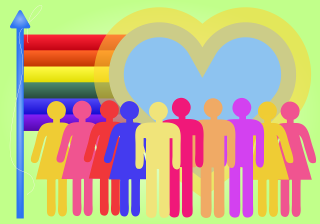KEY POINTS-
- The latest statistics are dire on the rates of anxiety, depression, and suicide among LGB people.
- Here are some resources available to help LGB people with their mental health.
- It's important to advocate for the mental health of LGB people.

This past June, the Substance Abuse and Mental Health Services Administration (SAMHSA) released an exhaustive survey report on the mental health status of the lesbian, gay, and bisexual (LGB) communities during 2021 and 2022.
Let's discuss those findings (they’re dire). I will also provide some solutions and resources that may be helpful if you belong to one of these groups.
Before we get to the report, first this: Whoever you are and whoever you love, you deserve to be content and to feel like you belong—because you do. You don’t need me or anyone else to tell you that, but I wanted to all the same. Hopefully, it provides at least some small comfort.
The SAMHSA Survey Results
By way of context, the researchers say this in the report’s introduction: “Sexual minorities [such as lesbian women, gay men, and bisexuals] experience unique stressors that can contribute to adverse substance use and mental health outcomes.” This reality “can be further compounded by the experience of being female or a person of color.”
These survey findings stood out to me:
- Bisexual females were six times more likely to have attempted suicides in the previous year than their straight peers.
- Bisexual males were three times more likely to be dealing with a serious mental illness in the previous year than their straight peers.
- One in seven lesbian women experienced a major depressive episode in the last year.
- One in three gay males reported a substance use disorder in the past year, while one in four lesbian females also did so.
As you can see, the report makes for depressing reading—but it’s important to know what’s happening. To my mind, we all need to be aware of what’s going on, and do what we can to help, including simply talking about it.
Finding LGBTQ+-Affirming Therapy
Before I list a few search engines that can help you find a therapist that specializes in LGBTQ+ communities, please know that these experts aren’t your only options. The vast majority of respected, fully licensed mental health and addiction treatment centers maintain an open-door policy for helping straight people, LGBTQ+ people, and everyone in between.
That said, if it’s a priority for you to find a treatment tailored to LGBTQ+ individuals, consider contacting one of the resources listed below:
- Association of LGBTQ+ Psychiatrists: aglp.org
- The Human Rights Campaign’s Healthcare Equity Index Map: hrc.org/resources/hei-map
- LGBTQ+ Healthcare Directory: lgbtqhealthcaredirectory.org
- Mental Health Match: mentalhealthmatch.com
- Pride Counseling: pridecounseling.com
- Psychology Today: psychologytoday.com/us/therapists
- The Trevor Project: thetrevorproject.org
SMART Recovery May Work Best
During my time in the addiction treatment field, I have found that some LBGTQ+ people—and certainly others as well—are not always comfortable with the religious messaging in traditional 12-step groups, like AA and NA. (For example, step 3 in the AA tradition states that we “made a decision to turn our will and our lives over to the care of God as we understood Him.”
A recent study published in the journal Families in Society found evidence that the SMART Recovery program may be a good option for people looking for a non-religious option.
The “SMART” part of the term stands for Self-Management and Recovery Training, a therapeutic strategy of moving away from addictive substances and negative behaviors to a life of positive self-regard and an openness to change.
To be clear, many LGBTQ+ clients do great with 12-step programs. But you may want to consider SMART Recovery as well. It’s simply another option that may feel more self-empowering and offer a better fit.
Reach Out For Help: It’s There For You
A lot of people—by no means just LGBTQ+ folks—are hesitant to seek care for their mental health or substance use. If you’re reluctant to call, ask a family member or friend to do it for you.
Whoever makes the initial contact, consider the brief, helpful script below. It makes it easier to know what to say:
- My identity/sexual orientation is ______. What experience do you have working with people like me?
- What experience do you have with the LGBTQ+ community?
- Do you have any specific training or certifications that relate to working with LGBTQ+ clients?
If the provider doesn’t answer these questions to your satisfaction, consider another provider. (It isn’t your job to educate people on these issues.)
Final Thoughts
Please know this: LGBTQ+ people are not inherently prone to greater levels of mental illness, higher suicide risk, or increased substance use. Those things happen as a reaction to how LGBTQ+ people are treated and stigmatized by others.
To which I say: Stay strong, be confident in who you are, don’t let the uninformed frame your reality, and yes, seek mental health help without hesitation when you need it.


